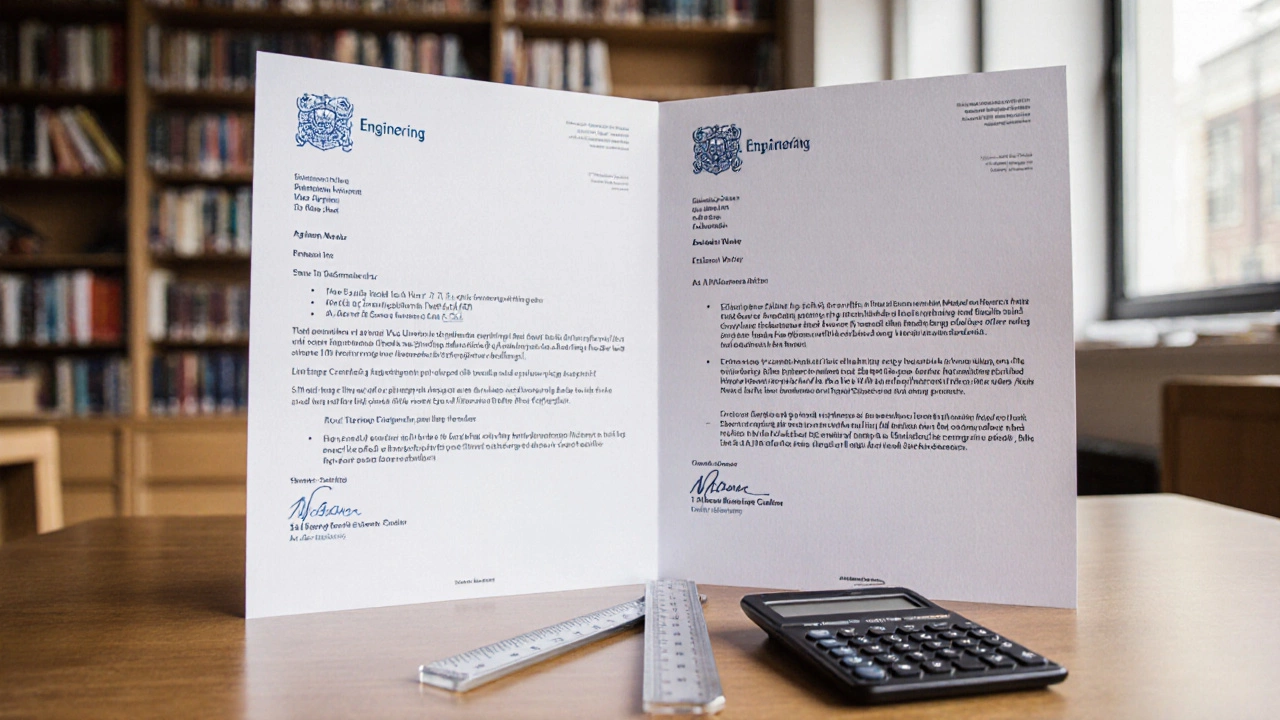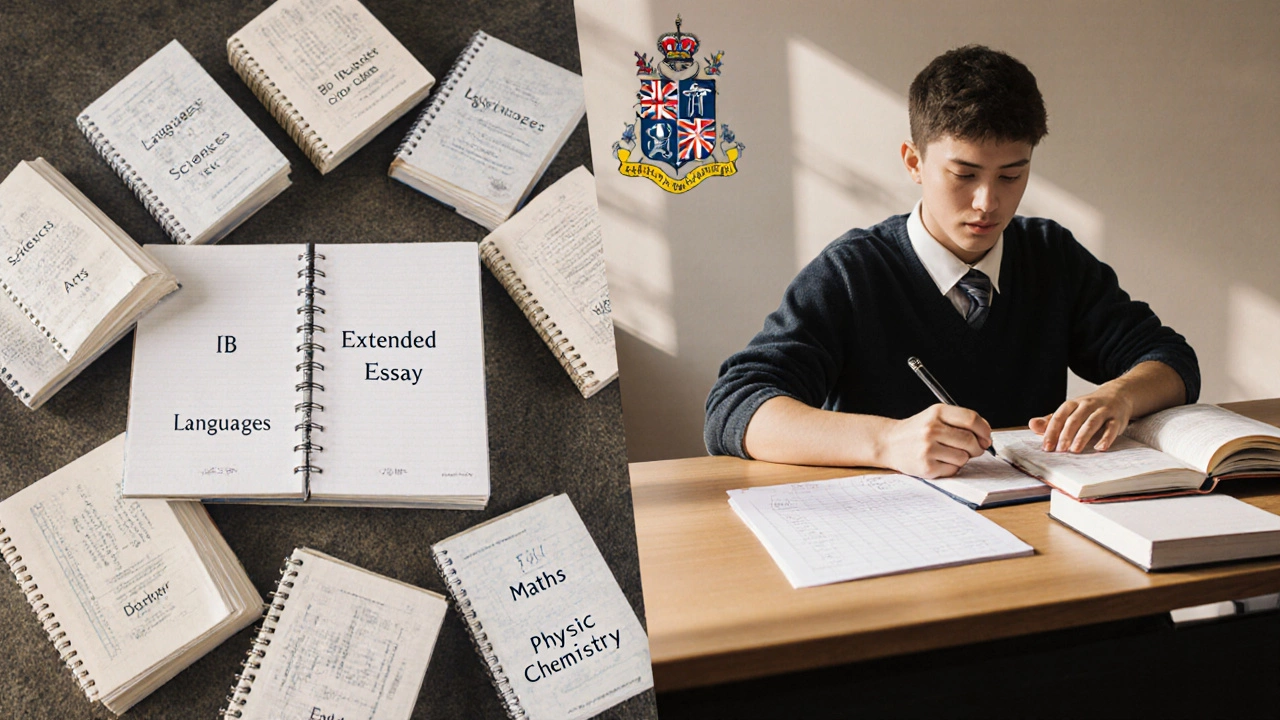IB vs A Levels Grade Converter
Compare Your Qualifications
This tool converts IB scores to A level equivalents and vice versa. It helps you understand how your grades match common UK university entry requirements.
Your Equivalent Grades
Enter your IB or A level grades to see the conversion.
When it comes to applying to UK universities, students often wonder: does it matter if you take the International Baccalaureate (IB) or A levels? The answer isn’t as simple as one being better than the other. UK universities don’t officially prefer one over the other - but how you perform in each system matters a lot more than which one you choose.
What UK Universities Actually Look For
Universities in the UK care about three things: your grades, the subjects you took, and how well you’ve prepared for your chosen degree. They don’t have a secret list that says ‘IB good, A levels bad.’ Instead, they set entry requirements based on what they need to see from applicants.
For example, if you’re applying for Engineering at Imperial College London, they might ask for A*AA in A levels - with A* in Mathematics and Physics. The same university might ask for 38 points in the IB, with 7 in Higher Level Maths and Physics. The difficulty and content are matched, not ranked.
According to data from UCAS (the UK’s university admissions system), over 90% of UK universities accept both qualifications equally. The University of Oxford, for instance, states clearly on its website: ‘We do not have a preference between A levels and the IB.’ The same goes for UCL, King’s College London, and the University of Edinburgh.
How IB and A Levels Differ in Structure
The biggest difference between IB and A levels isn’t prestige - it’s structure.
A levels let you focus on three or four subjects you’re strongest in. You go deep. If you love Biology, Chemistry, and Maths, you can spend two years mastering just those. That’s great if you already know what you want to study - like Medicine or Engineering - because you’re building direct subject knowledge.
The IB, on the other hand, requires you to study six subjects across different areas: languages, sciences, humanities, maths, and the arts. You also complete three core components: Theory of Knowledge (TOK), the Extended Essay (EE), and Creativity, Activity, Service (CAS). That means you’re learning more broadly, but with less depth in each subject.
Here’s how they compare:
| Feature | IB Diploma | A Levels |
|---|---|---|
| Number of subjects | 6 (3 Higher Level, 3 Standard Level) | 3-4 (usually) |
| Depth vs Breadth | Broad: covers sciences, arts, languages | Deep: focus on chosen subjects |
| Core requirements | TOK, EE, CAS | None |
| Grading scale | 1-7 per subject (max 45 points total) | A* to E per subject |
| Typical offer for top universities | 38-42 points | A*AA-A*A*A |
Some students thrive in the IB’s structured, all-around approach. Others feel overwhelmed by having to write a 4,000-word essay and manage CAS hours while studying six subjects. A levels give you space to concentrate - but only if you’ve already picked the right subjects for your degree.
Which One Is Easier to Get Top Grades In?
This is where things get personal.
Getting a 7 in IB Higher Level Maths is harder than getting an A in A level Maths - because the IB exam is longer, covers more topics, and includes more problem-solving under pressure. But getting an A* in A levels can be just as tough if you’re taking Further Maths or Physics.
Statistics from the IB Organization show that only about 17% of students worldwide score 40+ points (equivalent to A*A*A at A levels). Meanwhile, in England, around 20% of A level entries get A* grades. So the top end is competitive in both systems.
But here’s the catch: universities know this. They don’t compare your IB score to someone else’s A level score directly. They use conversion tables to make them fair. For example, a 36-point IB score is roughly equal to A*AA at A levels. That’s not an opinion - it’s what universities like Durham and Bristol use internally.

What Do Top Universities Say About IB vs A Levels?
Let’s look at real examples from actual admissions pages.
University of Cambridge: ‘We welcome applicants with either A levels or the IB. We assess each application on its own merits.’ They don’t even list separate requirements for IB and A levels on their course pages - just the equivalent grade.
London School of Economics (LSE): They often ask for 38 points with 6,6,6 in Higher Level subjects for Economics. For A levels, it’s A*A*A. The subjects must match - for example, Maths and Economics at A level, or Maths and Economics at HL in IB.
University of Manchester: They accept both and list the same UCAS tariff points for both. A 34-point IB is worth the same as AAB at A levels.
None of these universities say ‘IB is better.’ They say ‘We want these grades in these subjects.’
When IB Might Give You an Edge
There are situations where the IB can help - not because it’s preferred, but because it builds skills universities value.
The Extended Essay teaches you how to research, structure an argument, and cite sources properly. That’s exactly what you’ll need in your first year of university. The Theory of Knowledge course makes you think critically about how you know what you know - a skill that’s rare in A level students who’ve focused only on memorizing facts.
Students who’ve done IB often adapt faster to university-style learning. They’re used to writing essays, managing deadlines across subjects, and presenting ideas - not just taking exams.
For courses like History, Philosophy, Politics, or International Relations, this broad foundation can make your application stand out - especially if your personal statement shows how your IB experience shaped your thinking.
When A Levels Are the Better Choice
If you’re certain about your degree - say, Medicine, Engineering, or Computer Science - A levels give you a clearer path.
You can focus entirely on the subjects that matter. No one cares if you took Art or Spanish in your IB if you’re applying for Physics. But if you’ve taken A levels in Maths, Further Maths, Physics, and Chemistry, your application screams ‘I’m ready for this.’
A levels also let you retake exams. If you underperform in one subject, you can resit it. In IB, you can’t retake individual papers - you have to redo the whole diploma if you want a better score.
And if you’re applying to a university with very specific subject requirements - like Oxford’s Philosophy, Politics and Economics (PPE) course - A levels make it easier to meet them exactly. You don’t have to worry about whether your HL Economics counts the same as an A level in Economics.

What Matters Most: Your Grades and Your Fit
Here’s the truth: universities care about your final grades more than your qualification type.
If you’ve got 36 points in IB with 7,7,6 in your Higher Levels, you’re just as competitive as someone with A*A*A in A levels - as long as the subjects match the course.
But if you’ve got a 30-point IB score and you’re applying to a course that asks for 38, you won’t get in - no matter how hard you worked. The same goes for someone with BBB in A levels trying to get into a top university.
What really makes the difference is how well your subject choices match your intended degree. A student with A levels in Biology, Chemistry, and Maths has a stronger application for Medicine than someone with IB subjects in History, Geography, and Art - even if their IB score is higher.
Universities don’t pick based on prestige. They pick based on preparation.
What Should You Choose?
Don’t pick IB just because it sounds more ‘international’ or ‘prestigious.’ Don’t pick A levels because they seem easier.
Ask yourself:
- Do I want to study a broad range of subjects, or focus deeply on 3-4?
- Can I handle writing a 4,000-word essay and managing extracurriculars on top of six subjects?
- Am I certain about my degree? If yes, A levels give you a direct route.
- Do I enjoy research, critical thinking, and writing? Then IB might suit me better.
There’s no right answer - only the right fit.
Final Advice: Match Your Qualification to Your Goals
UK universities don’t prefer IB over A levels - or vice versa. They prefer students who are ready for their course.
If you’re aiming for a STEM degree and you’re strong in Maths and Science, A levels let you go deeper faster. If you’re applying for a humanities or social science degree and you enjoy writing, debating, and connecting ideas across subjects, IB gives you an advantage in skills - not grades.
Bottom line: Choose the system that lets you shine. Do your best in it. And make sure your subject choices line up with what your dream university wants.
It’s not about which qualification is better. It’s about which one lets you become the best version of yourself for university.
Do UK universities accept IB without the full diploma?
Most UK universities only accept the full IB Diploma for entry. If you’ve taken individual IB courses without completing the full diploma (e.g., just HL Maths and HL Chemistry), you’ll usually need to combine them with other qualifications like A levels or GCSEs. Some universities may consider them on a case-by-case basis, but it’s rare. Always check the specific entry requirements for your chosen course.
Is the IB harder than A levels?
It depends on what you mean by ‘harder.’ The IB asks you to manage more subjects and complete extra components like the Extended Essay and CAS, which adds workload. A levels are less broad but demand higher depth in fewer subjects. Top grades in both are challenging. Many students find the IB’s time management more stressful, while others struggle with the pressure of A level exams being the sole focus of their final grade.
Can I switch from A levels to IB halfway through?
Switching is extremely difficult and rarely advised. The IB is a two-year program designed to be taken from start to finish. Most schools won’t allow students to join mid-way because of the core requirements (TOK, EE, CAS) that need to be completed over the full period. If you’re unsure, it’s better to stick with your current path and focus on achieving your best grades.
Do Russell Group universities prefer IB?
No. Russell Group universities accept both qualifications equally. They use UCAS tariff points or direct grade equivalencies to compare applicants. For example, the University of Edinburgh accepts 36 points in IB or A*AA in A levels for most courses. The key is matching the subject requirements, not the qualification type.
Do I need to take Higher Level subjects in IB for STEM degrees?
Yes. For STEM degrees like Engineering, Physics, or Computer Science, universities expect you to have taken Higher Level Maths and often Higher Level Physics or Chemistry. Standard Level subjects usually aren’t sufficient. For example, Imperial College London requires 7 in HL Maths and 7 in HL Physics for Engineering. Always check the specific course page for subject level requirements.






